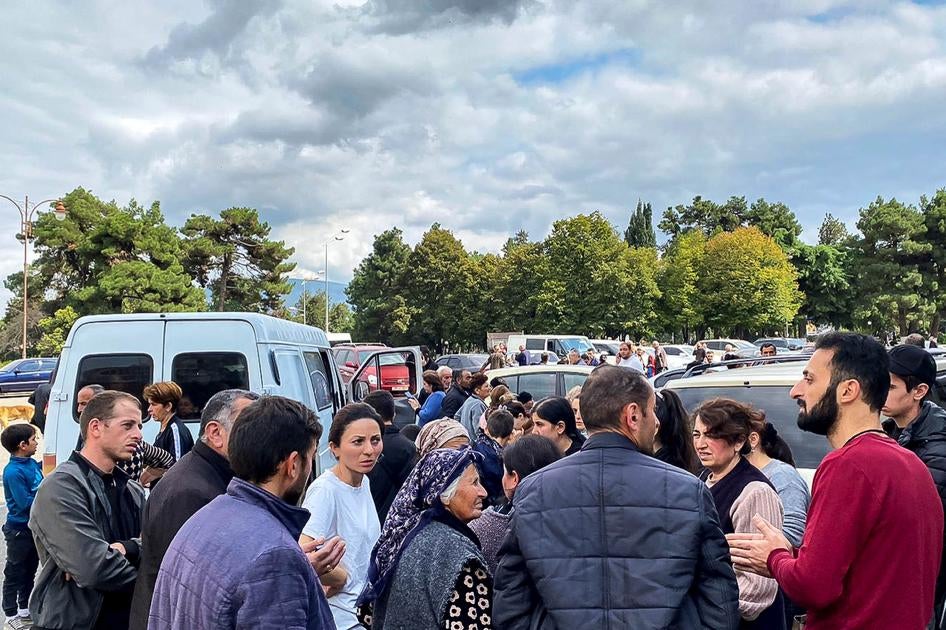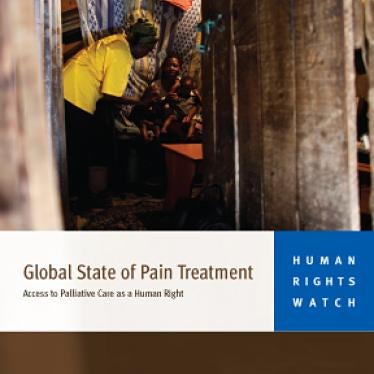(Berlin, September 23, 2023) – Thousands of civilians in Nagorno-Karabakh have dire humanitarian needs following Azerbaijan’s military operation to regain control over the region, Human Rights Watch said today. The military intervention followed months of acute shortages of food, medications, hygiene products, and other essential supplies to the region, as Azerbaijan had disrupted vehicular and pedestrian traffic to the region for over 9 months.
Azerbaijani authorities should take immediate steps to ensure the safety and humanitarian needs of Nagorno-Karabakh’s ethnic Armenian population, allowing humanitarian access without delay. Azerbaijan should allow civilians who wish to evacuate temporarily to Armenia, as well as people in urgent need of medical care who wish to leave, while respecting their right to return. Transportation of food, medicines, and other humanitarian necessities into Nagorno-Karabakh should be permitted from multiple directions, including through Armenia. International monitoring is needed to ensure that Azerbaijan meets its human rights obligations, in particular, toward Nagorno-Karabakh’s ethnic Armenian population.
“Civilians in Nagorno-Karabakh are facing a dire humanitarian crisis and grave uncertainty about their future,” said Hugh Williamson, Europe and Central Asia director at Human Rights Watch. “Azerbaijani authorities have said that everyone’s rights will be protected, but that is hard to take at face value after the months of severe hardships and decades of conflict.”
Unless Azerbaijani authorities take immediate steps to address humanitarian needs, including goods and services essential to people's economic and social rights, it would be credible to conclude that it is deliberately trying to make ethnic Armenians’ lives so miserable they will have no choice but to leave, Human Rights Watch said.
Since September 19, 2023, when Azerbaijan started military attacks to regain full control over Nagorno-Karabakh, thousands of civilians have fled their homes. Many fled to Stepanakert/Khankendi. Ethnic Armenian civilians cannot evacuate the region because Azerbaijan has not opened the border, which runs through the Lachin Corridor, the sole road connecting the region to Armenia.
On September 22, Russia’s Defense Ministry said that Russian peacekeeping force bases in Nagorno-Karabakh were "hosting 826 civilians,” and that “their accommodation, food supply, and medical care are provided.” Russian peacekeeping forces should ensure the humanitarian needs and protection of civilians who sought refuge on Russian military bases, Human Rights Watch said. On September 22, the Azerbaijani emergencies ministry announced that it had sent 40 tons of humanitarian assistance, including food and hygiene products, to Khankendi/Stepanakert for distribution to civilians.
For civilians who choose to evacuate, Azerbaijan is obligated to allow them to return to their homes under a fundamental precept of international human rights law, Human Rights Watch said.
On September 22, the European Court of Human Rights issued interim measures obligating Azerbaijan to “refrain from taking any measures which might entail breaches of their obligations under the [European Convention on Human Rights], notably regarding the right to life and the prohibition of torture and other degrading treatment or punishment.”
Nagorno-Karabakh is a region of Azerbaijan populated by ethnic Armenians who, together with Republic of Armenia forces, fought a war for independence in the early 1990s and remained defacto separate from Azerbaijan until 2020. Azerbaijan initiated hostilities in September 2020 to retake the area. A truce statement ending the 44-day war provided for Russian peacekeeping troops to have a presence in Nagorno-Karabakh and to control the Lachin Corridor until 2025.
Azerbaijan began blocking the Lachin Corridor on December 12, 2022, and in April established a checkpoint. Starting in mid-June, Azerbaijan blocked all humanitarian goods, which Russian peacekeepers and the International Committee for the Red Cross (ICRC) had been delivering, claiming unauthorized goods had been smuggled into Nagorno-Karabakh. It also periodically prevented the ICRC from transporting patients out of the enclave, Nagorno-Karabakh representatives told Human Rights Watch in August.
On September 19, Azerbaijani forces carried out military attacks aimed at re-establishing control over areas of Nagorno-Karabakh, which had remained under the control of the de facto local authorities after the 2020 truce. On September 20, a ceasefire was announced, followed the next day by initial talks between Azerbaijani authorities and representatives of Nagorno-Karabakh’s Armenian community.
In August, Human Rights Watch spoke remotely with 16 people who described the nearly complete disruption of movement of people, goods, and services including electricity, gas, and petrol. This disruption resulted in acute shortages of food, medications, hygiene products, and other supplies essential to people’s economic and social rights. People described facing shortages of these essential items with almost no access to dairy products, eggs, or meat, and intermittently bread.
Civilians now face even greater shortages. Under added widespread power cuts, they are desperately trying to locate their loved ones.
Hikmet Hajiyev, an adviser to Azerbaijani President Ilham Aliyev, posted on X, formerly Twitter, that Azerbaijani officials had told the ICRC, “all necessary conditions are provided and will be provided for the delivery of medicine, food and other goods by ICRC” via Lachin and another road.
By establishing a border checkpoint at the Lachin road and forcing it closed for months when no other arrangements were in place to ensure residents’ rights to food and health, Azerbaijan effectively has been denying these rights, Human Rights Watch said.
For seven months, Azerbaijan has refused to carry out a binding order by the International Court of Justice to “take all measures […] to ensure unimpeded movement of persons, vehicles, and cargo along the Lachin Corridor in both directions.” In December, the European Court of Human Rights issued an earlier set of interim measures, saying Azerbaijan should “take all measures that are within their jurisdiction to ensure safe passage through the ‘Lachin Corridor’ of seriously ill persons in need of medical treatment in Armenia and others who were stranded on the road without shelter or means of subsistence.”
Hajiyev’s post also stated that Nagorno-Karabakh military personnel who voluntarily lay down their weapons are “free,” though there are serious grounds to fear that Azerbaijani authorities may treat all adult males without disabilities as presumptive combatants. On September 19, when hostilities started, the Azerbaijani Defense Ministry messaged Nagorno-Karabakh civilians saying that shelter, food and water would be made available to women, children, older people, people with disabilities, and sick people. The statement implied that most adult males would not be treated as civilians, Human Rights Watch said.
“Thousands of ethnic Armenian people are displaced, and many separated from their families, fearing uncertainty and a bleak future,” Williamson said. “Urgent humanitarian access and monitoring are needed to ensure safety for Nagorno-Karabakh’s civilians.”







